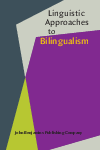
Linguistic Approaches to Bilingualism
Scope & Guideline
Fostering Insightful Research in Linguistic Approaches
Introduction
Aims and Scopes
- Bilingual Language Processing:
Exploring how bilingual individuals process languages in real-time, including studies on sentence processing, phonological interactions, and the effects of language dominance. - Language Acquisition in Bilingual Contexts:
Investigating the mechanisms and outcomes of language acquisition among bilinguals, including studies on morphosyntactic development, heritage language acquisition, and the impact of age and exposure. - Cross-Linguistic Influence:
Analyzing how knowledge of one language influences the use and learning of another, particularly in multilingual settings, with a focus on transfer phenomena in second and third language acquisition. - Sociolinguistic Perspectives on Bilingualism:
Examining the social aspects of bilingualism, including language attitudes, language shift, and the implications of bilingualism in diverse communities and educational settings. - Cognitive and Neurolinguistic Implications:
Investigating the cognitive effects of bilingualism, including the relationship between bilingualism and cognitive control, executive functions, and language processing in aging populations.
Trending and Emerging
- Translanguaging Practices:
There is a growing interest in translanguaging as a concept that transcends traditional bilingualism, emphasizing fluid language practices that reflect the realities of bilingual speakers, particularly in educational settings. - Heritage Language Research:
Research focusing on heritage language acquisition and its sociolinguistic implications is on the rise, highlighting the unique challenges and benefits faced by heritage speakers in maintaining their linguistic identities. - Cognitive Neuroscience of Bilingualism:
An increasing number of studies are leveraging neuroscientific methods to investigate how bilingualism affects cognitive processes and brain function, particularly in relation to language processing and aging. - Social and Cultural Dimensions of Bilingualism:
There is an emerging focus on the social and cultural contexts of bilingualism, examining how language practices intersect with identity, community, and policy in multilingual societies. - Impact of Digital Communication on Bilingualism:
Research exploring how digital communication platforms influence bilingual language use and development is gaining traction, particularly among younger generations who navigate multiple languages online.
Declining or Waning
- Traditional Bilingualism Models:
There has been a noticeable decline in papers focusing solely on traditional models of bilingualism, such as the L1-L2 binary, as researchers increasingly embrace more nuanced frameworks that consider multilingualism and complex language ecologies. - Static Language Competence Assessments:
Research focusing on static assessments of bilingual language competence, such as standardized tests, appears to be waning as the field shifts towards dynamic assessments that capture real-world language use and processing. - Linguistic Isolation Studies:
Studies that examine bilingualism in isolated or non-integrated contexts are becoming less common, as there is a growing emphasis on bilingualism as a socially embedded phenomenon, reflecting the realities of global multilingual interactions.
Similar Journals

JOURNAL OF MEMORY AND LANGUAGE
Exploring the Interplay Between Memory and LanguageJOURNAL OF MEMORY AND LANGUAGE, published by Academic Press Inc Elsevier Science, is a prestigious journal dedicated to advancing the understanding of cognitive processes related to language and memory. With an impact factor that underscores its authority and relevance, the journal has achieved remarkable recognition, ranking in the Q1 quartile across multiple disciplines such as Artificial Intelligence, Experimental and Cognitive Psychology, Linguistics and Language, and Neuropsychology and Physiological Psychology, as of 2023. With its origins tracing back to 1985, the journal continually provides a platform for high-quality research and innovative studies that intersect diverse fields including cognitive science and linguistics. Although it does not offer open access, the Journal of Memory and Language serves as an essential resource for researchers and professionals seeking to explore the intricate interplay between memory and language. Make sure to access state-of-the-art research that not only informs theoretical frameworks but also has practical implications in real-world situations.

Annual Review of Linguistics
Navigating the Evolving Landscape of Language StudiesAnnual Review of Linguistics is a premier scholarly journal dedicated to advancing the field of linguistics through comprehensive and insightful reviews of current research and emerging trends. Published by ANNUAL REVIEWS, this journal is recognized for its high impact, evidenced by its Q1 ranking in the Linguistics and Language category and exceptional placements in the Scopus Ranks, positioning it in the top 2% of its field. Since its inception in 2015, the journal has served as a vital resource for researchers, professionals, and students seeking to deepen their understanding of language theories, acquisition, processing, and sociolinguistics. With no Open Access currently available, the Annual Review of Linguistics is esteemed for its rigorous peer-reviewed articles that synthesize a wealth of knowledge, making it an indispensable tool for advancing research and dialogue within the linguistic community.

Estudios de Linguistica-Universidad de Alicante-ELUA
Unlocking the Future of Linguistics Through Open AccessEstudios de Linguistica-Universidad de Alicante-ELUA is a distinguished academic journal dedicated to advancing the field of linguistics, published by Universidad de Alicante. With an Open Access model adopted since 2020, ELUA facilitates greater accessibility to pioneering research for scholars and enthusiasts alike. The journal's ISSN is 0212-7636 and its E-ISSN is 2171-6692, ensuring it is indexed and easily discoverable in academic databases. Though the journal's H-Index is currently not specified, its commitment to disseminating high-quality linguistics research positions it as a valuable resource for researchers, professionals, and students. The journal aims to foster scholarly dialogue and innovation in various linguistic domains, making it an essential platform for sharing insights and findings that shape contemporary linguistic studies. Based in Alicante, Spain, ELUA is poised to contribute significantly to the global linguistics landscape.
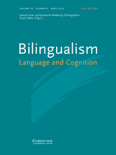
Bilingualism-Language and Cognition
Connecting Linguistic Diversity with Cognitive ScienceBilingualism-Language and Cognition, published by Cambridge University Press, is a leading journal in the fields of Education and Linguistics, renowned for its rigorous academic contributions and influential research. With an impressive impact factor placing it in the Q1 quartile of both fields, this journal ranks among the top-tier publications globally, reflecting its commitment to advancing the understanding of bilingualism and its cognitive implications. Since its inception in 2005, Bilingualism-Language and Cognition has garnered significant attention, evidenced by its remarkable Scopus rankings—11th in Language and Linguistics and 12th in Social Sciences. Dedicated to publishing high-quality original research, reviews, and integrative studies, the journal aims to foster interdisciplinary dialogue among researchers, educators, and practitioners. Although not currently an open access journal, it remains a vital resource for those engaged in bilingualism research and its cognitive dimensions, contributing to the academic landscape from its home in Cambridge, United Kingdom.

Acta Linguistica Academica
Exploring the Frontiers of Language and CultureActa Linguistica Academica is a distinguished academic journal published by Akademiai Kiado ZRT, located in Hungary. Since its inception in 2017, the journal has occupied a premier position in its field, achieving Q1 rankings in both Cultural Studies and Linguistics and Language, as well as in Literature and Literary Theory in 2023. With an impressive Scopus ranking placing it in the top percentiles across various categories, Acta Linguistica Academica stands out as a vital resource for researchers, professionals, and students dedicated to exploring the nuances of language, literature, and cultural dynamics. The journal provides a platform for high-quality research and diverse perspectives, facilitating the dissemination of innovative ideas and comprehensive analyses in these disciplines. As an esteemed open-access journal, it ensures that cutting-edge research is readily available to the academic community and the public at large, affirming its commitment to accessibility and knowledge sharing.
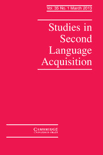
STUDIES IN SECOND LANGUAGE ACQUISITION
Connecting theory and practice in language education.STUDIES IN SECOND LANGUAGE ACQUISITION, published by Cambridge University Press, is a premier journal dedicated to advancing the field of second language acquisition. With an ISSN of 0272-2631 and an E-ISSN of 1470-1545, this journal has carved its niche as a leading resource for scholars and practitioners alike since 1978. Recognized in Q1 quartiles across both Education and Linguistics and Language, and ranked within the top 2% in its fields according to Scopus, it provides a platform for cutting-edge research that addresses the complexities of language learning and teaching. Although it does not currently offer open access, the journal remains widely accessible through institutional subscriptions, ensuring that groundbreaking research reaches a global audience. With a focus on empirical studies, theoretical discussions, and innovative methodologies, STUDIES IN SECOND LANGUAGE ACQUISITION is essential for those seeking to deepen their understanding of language education, making it a must-read for researchers, educators, and students committed to the evolving landscape of language acquisition.
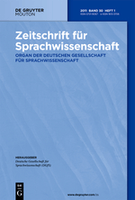
Zeitschrift fur Sprachwissenschaft
Advancing the frontiers of linguistic research.Zeitschrift für Sprachwissenschaft, published by DE GRUYTER MOUTON, is a leading journal in the field of linguistics that has been contributing to scholarly discourse since its inception in 1982. With an ISSN of 0721-9067 and an E-ISSN of 1613-3706, the journal offers an Open Access model since 2017, ensuring widespread dissemination of research findings. Positioned in Q2 of the Linguistics and Language category for 2023, it ranks #312 out of 1088 in the Arts and Humanities and #370 out of 1167 in Social Sciences, reflecting its robust impact and contribution to the field. This German-based journal covers a diverse range of topics related to language and linguistics, appealing to researchers, professionals, and students alike. By fostering interdisciplinary dialogue and showcasing innovative research, Zeitschrift für Sprachwissenschaft plays a critical role in advancing our understanding of language in various contexts. The journal is located at Genthiner Strasse 13, 10785 Berlin, Germany, inviting scholars globally to contribute to its mission of enhancing linguistics research.

Revista Virtual de Estudos da Linguagem-ReVEL
Connecting Scholars Through Open Access Linguistic ResearchRevista Virtual de Estudos da Linguagem-ReVEL is a prominent academic journal dedicated to the field of linguistics, published by REVISTA VIRTUAL ESTUDOS LINGUAGEM in Brazil. With its ISSN 1678-8931, ReVEL aims to provide a platform for scholarly communication and dissemination of research across diverse areas of language studies, including sociolinguistics, language acquisition, and discourse analysis. As an open-access journal, it fosters accessibility to important linguistic research, allowing researchers, educators, and students alike to engage with the latest findings without subscription barriers. The journal’s focus on innovative methodologies and interdisciplinary approaches makes it a valuable resource for those seeking to deepen their understanding of language dynamics in various contexts. By contributing to the growing body of knowledge in this field, ReVEL plays a crucial role in promoting scholarly dialogue and enhancing the visibility of Brazilian linguistic research on a global scale.
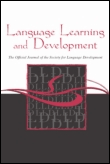
Language Learning and Development
Exploring innovative methodologies for effective language learning.Language Learning and Development, published by Routledge Journals, Taylor & Francis Ltd, is a premier academic journal that stands at the forefront of research in the fields of education and linguistics. With a robust ISSN of 1547-5441 and E-ISSN 1547-3341, this journal not only boasts an impressive Q1 classification in both Education and Linguistics for 2023 but also ranks favorably in Scopus metrics, highlighting its significance in advancing scholarship. Situated in the United Kingdom, it focuses on the intersection of language acquisition, cognitive development, and pedagogical practices, making it an essential resource for researchers, educators, and students alike. Given its commitment to publishing rigorous research articles, Language Learning and Development aims to foster dialogue and explore innovative methodologies in language learning, providing an invaluable platform for contemporary issues and advancements in this dynamic field.

Language and Cognition
Advancing Insights in Linguistics and CognitionLanguage and Cognition is a premier peer-reviewed journal published by Cambridge University Press, dedicated to advancing the fields of language, linguistics, and cognitive psychology. With an ISSN of 1866-9808 and E-ISSN of 1866-9859, it has rapidly established itself as a pivotal resource for researchers, educators, and practitioners alike. Recognized for its rigorous scholarship, the journal holds a Q1 ranking in Linguistics and Language and a Q2 ranking in Experimental and Cognitive Psychology for 2023, reflecting its esteemed positioning within the academic community. Since transitioning to open access in 2023, it has broadened its reach, making cutting-edge research accessible to a global audience. The journal's emphasis on interdisciplinary studies ensures a comprehensive exploration of the interactions between language and cognitive processes, fostering deeper insights and fostering collaboration across domains. Researchers and professionals looking to stay at the forefront of advancements in these vital areas will find Language and Cognition an invaluable platform for disseminating their findings and engaging with contemporary debates.